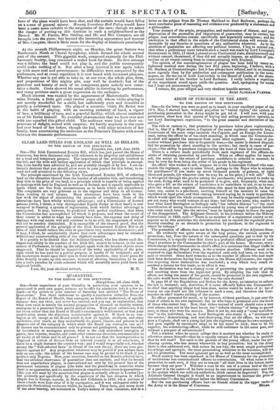CLEAR LAND-TITLES FOR ENGLAND AS WELL AS IRELAND. TO THE
EDITOR OF THE SPECTATOR.
Lincoln's Inn, 14th June 1849.
SIR—The Irish Encumbered Estates Bill, which has just passed the House of Commons, has been discussed only with reference to its propriety and suitableness for a local and temporary purpose. The importance of the principle involved in the bill, and the wide and lasting application of which that principle is suscept- ible, have hardly been adverted to, and are probably thought of by few. I em ex- tremely desirous that you should allow room in your journal for this letter, to re- cord and call attention to the following views. The principle sanctioned by the Irish Encumbered Estates Bill, of relieving land on the alienation thereof from the burden of all anterior title, and transferring that title to the price of the land, is a principle which is capable of being applied to dealings with land in England as well as in Ireland, and is equally applicable to lands which are free from encumbrances as to lands which are encumbered. The complaints are very grievous as to the expense and delay in all transac- tions relating to real estates. Many alterations have been made in the law with the object of diminishing the grounds of complaint. None of the alterations have been wholly without advantage ; and a Commission of learned persons (with, I think, a very distinguished Equity Judge at their head) is now occupied in framing a system of registration, from which further advantage is anticipated. It may, however, be predicted with perfect confidence, that when the Commission has accomplished all which it proposes, and when the result of their labour is added to what has already been done, the expense and delay of dealings with real estate will still continue to be an evil, the magnitude of which will not be sensibly diminished. It is susceptible of the clearest proof, that the general application of the principle of the Irish Encumbered Estates Bill to all sales of land would reduce the evils in question to very moderate dimensions; and it may, I think, be satisfactorily shown that such advantages may be obtained without any countervailing evils of the slightest moment. It is greatly to be desired that the Solicitor-General, who has shown such dis- tinguished ability in the conduct of the Irish bill, should be induced, in the next sedsion of Parliament, to take up the subject again with the broader objects above suggested. That he should be insensible of the wider applicability of the prin- ciple which he has used for a partial purpose, is hardly to be imagined ; and if the landowners would open their eyes to their own interests, they would press Sir John Rornilly to take up this measure, instead of allowing themselves to be put into a fool's paradise by crude schemes which will assuredly never yield them the slightest benefit


























 Previous page
Previous page